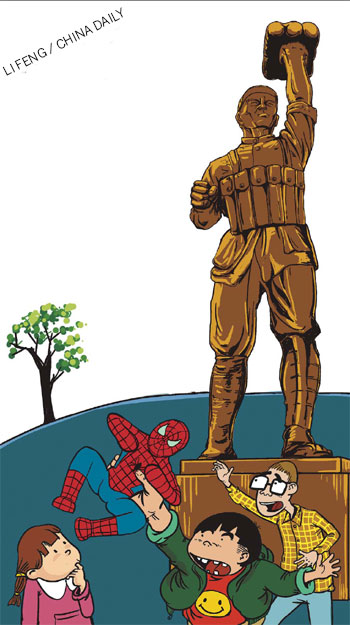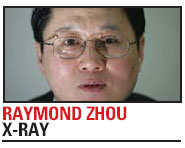Hero is as hero does

While today's young Chinese may struggle to point to their heroes, the idea of heroism is very much alive.
In what ways does a Chinese hero differ from an American one? That was one of the questions I had to ponder before taking part in a forum discussion at the Bookworm bookstore recently. When The World of Chinese, the magazine that organized that event, first sounded me about the topic, the oft-quoted line from Hollywood movies, "You're my hero", dashed through my head. And it took a second for me to realize that we Chinese do not say it under similar circumstances. We would say, "You did great!" or, "It was so nice of you to do that!" The term hero occupies an exalted status in the Chinese language. It takes much more to be a hero in China than in the United States, for example. Based on my understanding, Americans often define a hero as someone ordinary who did something extraordinary. Even fictional superheroes like Spiderman have humble roots. The implicit meaning is, anyone can be a hero.
Not so in the Chinese context. Chinese heroes are usually ordained by the authorities, their qualities hammered home through the education system. If your neighbor risked his life to save you from a fire, you would thank him profusely. But it wouldn't automatically make him a "hero". For that, his act of courage would have to be covered by a contingent of government media organizations and selected by the government publicity machine for special prominence, which would then issue edicts to turn him into a model, a prototype so to speak.
What he did would not be a spontaneous act of selflessness, but be elevated by writing into so-called "theoretical heights". There would be pages and pages of psychological probing into the origin of his greatness and these articles would be printed in the press several times and also be inducted into the classroom.
There is another key difference: Americans may call their celebrity singers, movie stars and athletes "heroes". This is rarely so in China, where there is a more discernible gap between heroes and pop idols. You may attract a lot of eyeballs and command much clout, but that doesn't make you a hero.
A hero, as I was brought up to believe, has to be associated with tremendous courage. He or she has to stand down an army of enemies. There is this connotation of beating great odds.

Another factor is self-sacrifice. Not only must the drowning kid be saved, but you must give up your own life. Otherwise, you just did "a good deed", which is several echelons down from heroism.
If you combine the above yardsticks, you'll understand why Chinese heroes are mostly minted in wartime. If you are simply a long shot at a sports contest like Rocky, you'll be considered lucky or even inspiring if you win. But you did not kill yourself in the process. Even if you saved a drowning kid and got drowned yourself, the drama may still be insufficient. You've got to save a hundred, or at least a dozen, before you collapse yielding your last plank to that last kid.
At the question-and-answer session at Bookworm, I was asked why Chinese youths, as found in a poll, no longer have any heroes. Is it because of the spiritual vacuum in the aftermath of an ideological shift and the sudden spurt of wealth?
To my surprise, I found that what the Western audience deemed regressive I saw as progressive. The ditching of establishment-anointed heroes is a sign of rebelliousness and independence, even though it can be taken to extremes. When some in China hail Hitler as a hero, as one audience member suggested, I don't think they are neo-Nazis. They just want to reverse everything they have been taught, and in the process, reveal their immaturity.
Western society is built on individualism. When someone acts in the interests of the public while hurting his own interests, it is something extraordinary and could be regarded as heroism. Here in China, we are trained to do everything for the greater good. (That, at least, is the ideal, regardless of the reality.) So, when someone stands up and defends his own right as an individual, it takes real guts. That does not mean Chinese society, or the younger generations in particular, have spurned traditional virtues shared by all humanity. As one could see from the Sichuan earthquake and other disasters, random acts of altruism and valor always receive praise.
The young no longer take for granted those "heroes" cherry-picked and polished by the authorities. A typical establishment-sanctified hero would totally disregard the needs of his family - his dying father, his heavily pregnant wife - while rushing to the rescue of others. They raise doubts about such a "hero" precisely because he has been so de-humanized in the editing room.
I happen to have interviewed a few of these "local heroes" - they are not called heroes since they're still living, but literally "figures that moved China", the latest euphemism for the living kind. Invariably, they spoke their minds and came off as very believable. But when I checked their stories in the Chinese press, they were portrayed as born-again Mother Teresas and ludicrously exaggerated.
That's why more and more people do not take their creation seriously. They know that what these people have done has been blown up and they instinctively shrink them to bite-size, sometimes overdoing it.
You can feel the palpable shift toward ordinary heroes. When a bus driver in Nanjing pulled over his vehicle to the side just before fainting at the wheel, he was hailed by many as a hero. Yet, some disagreed, saying he did what he was supposed to do in that situation. In other words, they felt a high degree of professionalism was not enough to prove his mettle.
Yes, it would not have been enough to put a halo around his head. That would have destroyed his image anyway. But he did touch a lot of hearts.


















